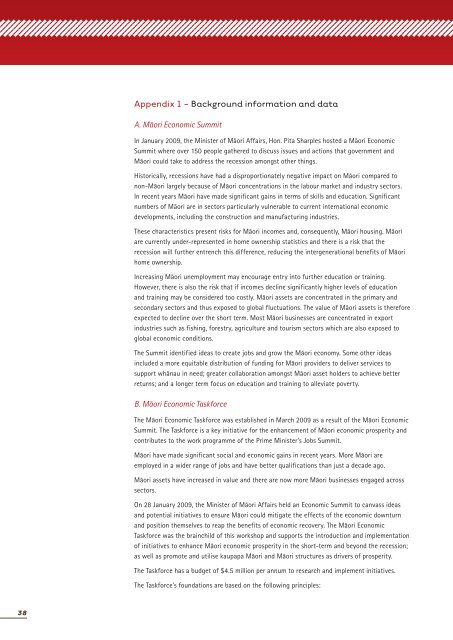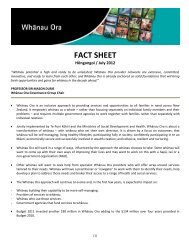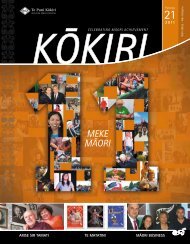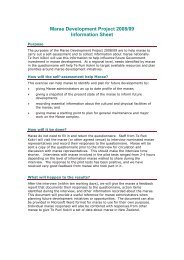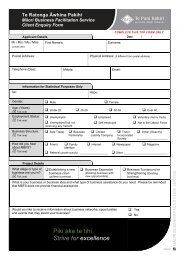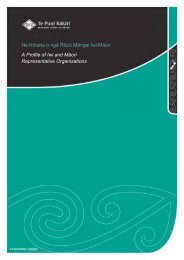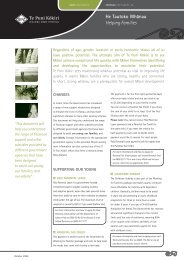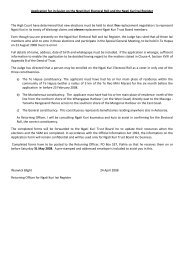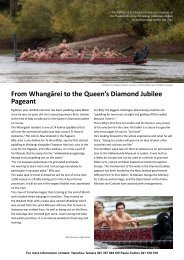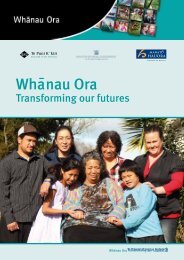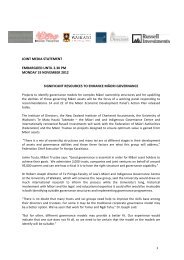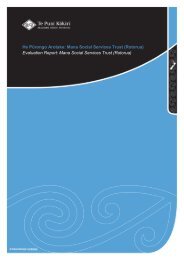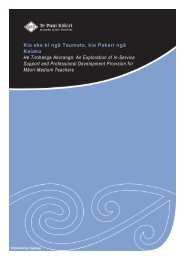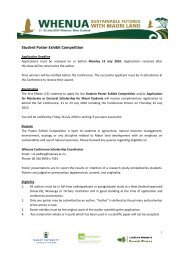He Oranga Hapori: A model for raising Maori ... - Te Puni Kokiri
He Oranga Hapori: A model for raising Maori ... - Te Puni Kokiri
He Oranga Hapori: A model for raising Maori ... - Te Puni Kokiri
- No tags were found...
Create successful ePaper yourself
Turn your PDF publications into a flip-book with our unique Google optimized e-Paper software.
Appendix 1 - Background in<strong>for</strong>mation and dataA. Mäori Economic SummitIn January 2009, the Minister of Mäori Affairs, Hon. Pita Sharples hosted a Mäori EconomicSummit where over 150 people gathered to discuss issues and actions that government andMäori could take to address the recession amongst other things.Historically, recessions have had a disproportionately negative impact on Mäori compared tonon-Mäori largely because of Mäori concentrations in the labour market and industry sectors.In recent years Mäori have made significant gains in terms of skills and education. Significantnumbers of Mäori are in sectors particularly vulnerable to current international economicdevelopments, including the construction and manufacturing industries.These characteristics present risks <strong>for</strong> Mäori incomes and, consequently, Mäori housing. Mäoriare currently under-represented in home ownership statistics and there is a risk that therecession will further entrench this difference, reducing the intergenerational benefits of Mäorihome ownership.Increasing Mäori unemployment may encourage entry into further education or training.However, there is also the risk that if incomes decline significantly higher levels of educationand training may be considered too costly. Mäori assets are concentrated in the primary andsecondary sectors and thus exposed to global fluctuations. The value of Mäori assets is there<strong>for</strong>eexpected to decline over the short term. Most Mäori businesses are concentrated in exportindustries such as fishing, <strong>for</strong>estry, agriculture and tourism sectors which are also exposed toglobal economic conditions.The Summit identified ideas to create jobs and grow the Mäori economy. Some other ideasincluded a more equitable distribution of funding <strong>for</strong> Mäori providers to deliver services tosupport whänau in need; greater collaboration amongst Mäori asset holders to achieve betterreturns; and a longer term focus on education and training to alleviate poverty.B. Mäori Economic Task<strong>for</strong>ceThe Mäori Economic Task<strong>for</strong>ce was established in March 2009 as a result of the Mäori EconomicSummit. The Task<strong>for</strong>ce is a key initiative <strong>for</strong> the enhancement of Mäori economic prosperity andcontributes to the work programme of the Prime Minister’s Jobs Summit.Mäori have made significant social and economic gains in recent years. More Mäori areemployed in a wider range of jobs and have better qualifications than just a decade ago.Mäori assets have increased in value and there are now more Mäori businesses engaged acrosssectors.On 28 January 2009, the Minister of Mäori Affairs held an Economic Summit to canvass ideasand potential initiatives to ensure Mäori could mitigate the effects of the economic downturnand position themselves to reap the benefits of economic recovery. The Mäori EconomicTask<strong>for</strong>ce was the brainchild of this workshop and supports the introduction and implementationof initiatives to enhance Mäori economic prosperity in the short-term and beyond the recession;as well as promote and utilise kaupapa Mäori and Mäori structures as drivers of prosperity.The Task<strong>for</strong>ce has a budget of $4.5 million per annum to research and implement initiatives.The Task<strong>for</strong>ce’s foundations are based on the following principles:38


